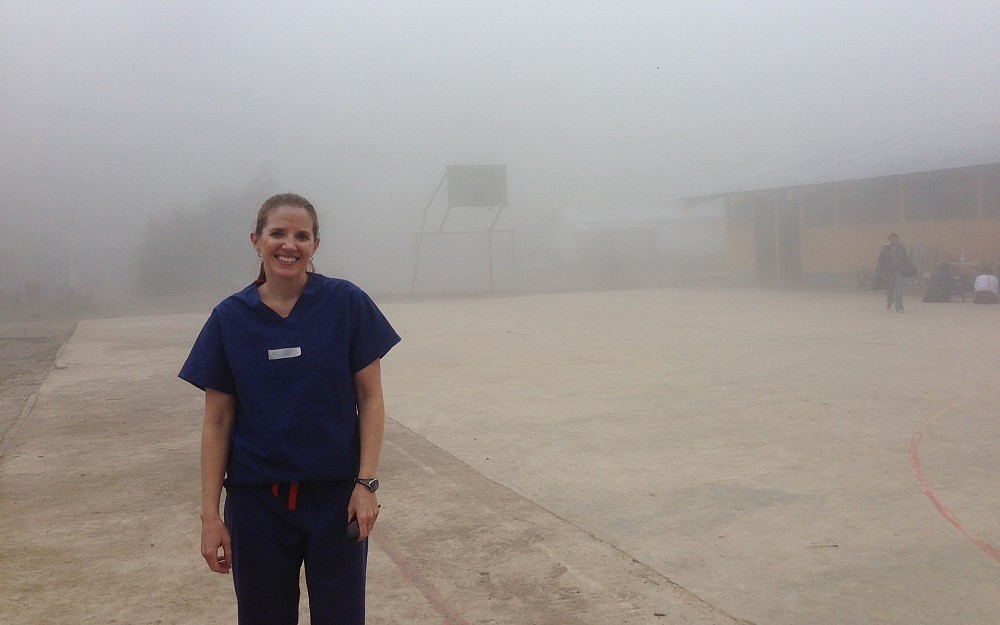
Nursing Grad Plans Future in Rural Primary Care
When your 11-year-old daughter tells you shes proud of you, you know youve done something right.
On April 26, Sarah Kuhnells very proud daughteralong with the rest of her proud and supportive familywill watch as she is awarded her masters degree in nursing from the University of Cincinnati.
Born in Cincinnati and raised in Clermont County, Kuhnell was a first-generation college student when she first entered UC in the early 1990s. She was labeled "pre-med and was awarded an English degree, but chose to get her masters in education and became a teacher instead of pursuing medicine.
Not quite fulfilled, and with health care still very much on her mind, Kuhnell left teaching to become a nurse.
"Just because you have to work to put food on the table doesnt mean you cant also love your job, Kuhnell says.
Starting Slow
In 2006, she was accepted into UCs accelerated nursing programan option that directly admits qualified students to both the bachelors and masters programs. She began taking the prerequisites needed for the bachelors portion of the training.
Kuhnell started slow. With two young children and 13 years separating her from her first steps on UCs campus as an undergrad, she wasnt convinced she could jump right in.
"I took one class at a time and told myself, If I dont get an A taking just one class, theres no way I can handle this, Kuhnell recalls.
The "As came, and kept coming, and soon she was a full-time nursing student with a full-ride University Graduate School scholarship and research assistantship position.
Kuhnell finished her bachelors in 2011 and began working as an emergency room nurse at Mercy Healths Clermont Hospitala position and organization she lovedbut said she saw so many people whose illnesses could have been prevented, or at least lessened, if they had just had primary care.
"I didn't want to just treat these terribly sick people; I wanted to prevent them from becoming so sick, Kuhnell says. "I decided that I wanted to have a role in primary careto be a family provider.
In 2012, Kuhnell returned to UC to complete the masters portion of her accelerated program. A three-month clinical rotation at Winchester Family Medicine in Adams County gave her the chance to develop relationships with patients and watch their progression and healing.
When she graduates, shell assume the title of family nurse practitioner.
The Journey
Her journey hasnt come without uncertainty or hardship. In 2013, as she entered her final year of the masters program, Kuhnell was told her financial aid didnt come through, and she was no longer receiving a University Graduate Scholarship.
Her husband had just gone into full-time ministrya dream of his ownafter serving for many years as the breadwinner so that Kuhnell could continue with school.
Devastatedand worried about finances and the down payment shed just placed on her service trip to Guatemala with the UC Family Medicine Residency ProgramKuhnell turned to the College of Nursings assistant dean for student affairs, Krista Maddox, PhD, who was able to guide her to an application for the Roderick and Barbara Barr Scholarship.
The Barrs established the scholarship at UC in 2001 as a tribute to the excellent care provided to their close relative by a nurse practitioner.
Sure enough, Kuhnell met the criteria, and the funding from that gift allowed her to continue in the program. She was able to personally thank the Barrs for their support at the 2013 College of Nursing scholarship dinner.
"I just couldnt believe that someone who didnt even know me was willing to pay for me to go to school, Kuhnell says. "It gave me the motivation to keep working.
For Spring 2014, Kuhnell was once again supported by a University Graduate Scholarship and serves as a teaching assistant 20 hours per week. She was able to take a leave of absence from Clermont Hospital to maintain her academic and teaching schedules.
Her plan is to find a position where shes able to provide primary care services to underserved rural populations.
She also has a passion for volunteering and, twice a month, offers health and nutrition counseling at the HealthStop, a program she founded within the Care Center at Northstar Community Church in Loveland. She regularly sees about a dozen patients each time the HealthStop is open.
Of her experience at UC, Kuhnell expresses nothing but gratitude.
"Its like Ive been pulled alongledby a string. The College of Nursing has been so incredibly supportive and I just feel so blessed to have been able to go to school.
Related Stories
Fellowship aimed at diversifying the nursing workforce...
May 15, 2024
To help prepare and expand a nursing workforce that is reflective of and responsive to an increasingly diverse patient population, UC College of Nursing launched its Cultivating Undergraduate Nursing Resilience and Equity (CURE) program in the fall of 2021.
UC study: Severe ischemic strokes rare in total patient...
May 15, 2024
The University of Cincinnati’s Yasmin Aziz will present research at the European Stroke Organisation Conference that found severe ischemic strokes with the most severe damage are rare in the total stroke patient population.
Increasing syphilis cases highlight treatment barriers across...
May 14, 2024
The University of Cincinnati's Carl Fichtenbaum spoke with the Cincinnati Enquirer about a recent report that found Hamilton County syphilis cases reached a six-year high in 2023.
